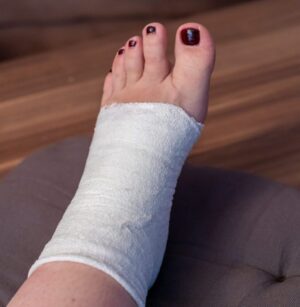 New research published in The Lancet suggests that early weight bearing may not lead to worse outcomes for patients working to recover after ankle surgery, and in fact it may help prevent some potential issues that can arise during the rehabilitation process.
New research published in The Lancet suggests that early weight bearing may not lead to worse outcomes for patients working to recover after ankle surgery, and in fact it may help prevent some potential issues that can arise during the rehabilitation process.
Although they hope to confirm their findings with additional research, the medical experts who worked on the study found that limited weight bearing during the healing process may help to reduce stiffness and muscle atrophy that is oftentimes seen during the recovery process after an ankle fracture. These findings would mark a change to the standard treatment protocol, which recommends keeping a patient off their foot until a lot more healing has taken place.
“It’s fantastic how the NIHR (National Institute for Health and Care Research) has facilitated collaboration among clinical teams across the UK to challenge the long-standing practice of delayed weight-bearing after surgery,” said Chris Bretherton, NIHR Academic Clinical Lecturer in the Bone and Joint Health group, Centre for Neuroscience, Surgery and Trauma. “This research will empower surgeons to promote early weight-bearing, significantly aiding patients during the most critical phases of their recovery from ankle fractures.”
Finding The Right Recovery Protocol
While being cautious with post-op weight bearing after ankle fracture surgery may be considered the general standard, it’s far from unilaterally accepted as the best recovery protocol. For some, waiting until more healing has taken place is absolutely the right move, but for others with a more stable fracture pattern and the right surgical approach, earlier weight bearing may the the right course of action.
There are so many underlying factors that help to predict how someone may recover after a surgical procedure that it would be irresponsible to the patient to always fall back on the current standard of care. Moreover, healthcare specialists are always looking to challenge the norm and find better ways to help patients heal after surgery, and it sounds like we may have a new standard in the near future.
We’re glad that researchers are continuing to challenge the accepted medical norms, and know that is how Dr. Silverman handles all his patients. He wants to understand your issue and provide a highly individualized level of care to ensure you have the best chance of making a strong recovery. Let us help figure out the best treatment or recovery course for whatever is troubling your feet or ankles.